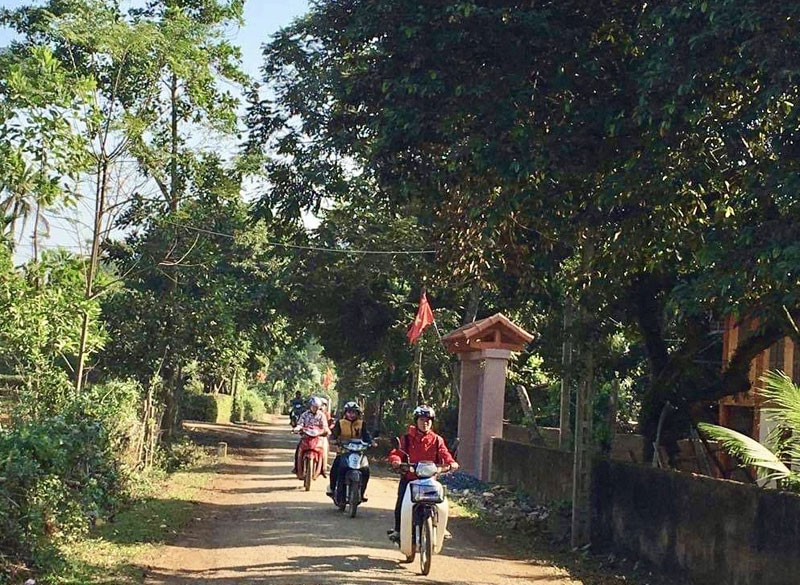
(HBO) – Van Son commune of Lac Son district, Hoa Binh province, has since 2017 been among the beneficiaries of Programme 135 which targets particularly disadvantaged communes nationwide. Thanks to priority given to the paving of roads linking communes and hamlets and those traversing farmland, transport infrastructure has been improved considerably, thereby creating a turning point in local socio-economic development.
 Roads connecting villages in Van Son commune of Lac Son
district have been paved, thus facilitating travel and goods transport.
Roads connecting villages in Van Son commune of Lac Son
district have been paved, thus facilitating travel and goods transport.
Vice Chairman of the Van Son communal People’s
Committee Bui Van Nen said thanks to assistance from the programme, transport
infrastructure has gained a facelift and some irrigation facilities built to
help with agricultural development.
Local roads have had about 70 percent of their
total length concreted over, including those from the Van Son Primary and
Senior High School to Roc Khum village, from the commune’s centre to Tre
village of Thuong Coc commune, from Roc Khum village to Khang Trao village, and
from the communal People’s Committee office to Bung village of Nhan Nghia
commune. Another road from Khang Trao village to Ray village is set to be
upgraded this year, the official noted.
In the past, unfavourable road conditions
hampered socio-economic development in Van Son commune for a long period of
time. Thanks to Programme 135, this rural area has undergone substantial
improvement, thereby facilitating goods transport, house construction and
repair, as well as the ensuring of political security and social order and
safety.
Per capita income increased from 17 million VND
(over 730 USD at the current exchange rate) in 2017 to 24 million VND in 2019,
and it is expected to reach 28 million VND this year./.
The Standing Board of the Hoa Binh provincial Party Committee has agreed in principle on a proposal by the Standing Board of the Party Committee of Hoa Binh city to gather feedback on the city’s 1:2000 zoning plan, which forms part of its broader urban development strategy.
Hoa Binh province has made notable progress in public administration reform and digital government development, with the satisfaction index among citizens and businesses reaching over 84%, according to recent government evaluations.
Thanks to great efforts by local authorities in recent times, the governance and public administration performance of Mai Chau district has been significantly improved.
In the afternoon of June 6, the Party Committee, the People's Council, the People's Committee and the Fatherland Front of Lac Son district solemnly held a meeting to celebrate the 139th anniversary of the district's founding (1886–2025) and the 79th anniversary of the establishment of the district's Party Committee (1946–2025). There was the attendance of Mr. Bui Van Thang, the Vice Chairman of the Provincial People's Council; Mr. Quach Tat Liem, the Vice Chairman of the Provincial People's Committee; Ms. Dang Bich Ngoc, the Deputy Head of the National Assembly Delegation of the province; as well as the former leaders of the province and district through various periods, who are the natives of the district.
Implementing the Politburo’s Resolution No. 57-NQ/TW on breakthroughs in science – technology, innovation, and digital transformation is a golden opportunity for the northern mountainous province of Hoa Binh to renew growth model, improve competitive edge and shorten digital gap.
Resolution 57-NQ/TW, issued by the Politburo on December 22, 2024, identifies sci-tech, innovation, and digital transformation as strategic breakthroughs to build a developed and prosperous nation. In Hoa Binh province, this spirit is not just a slogan, it’s being put into action through concrete initiatives that form a "new development triangle”: digital citizenship, digital economy, and digital administration.



 Roads connecting villages in Van Son commune of Lac Son
district have been paved, thus facilitating travel and goods transport.
Roads connecting villages in Van Son commune of Lac Son
district have been paved, thus facilitating travel and goods transport.